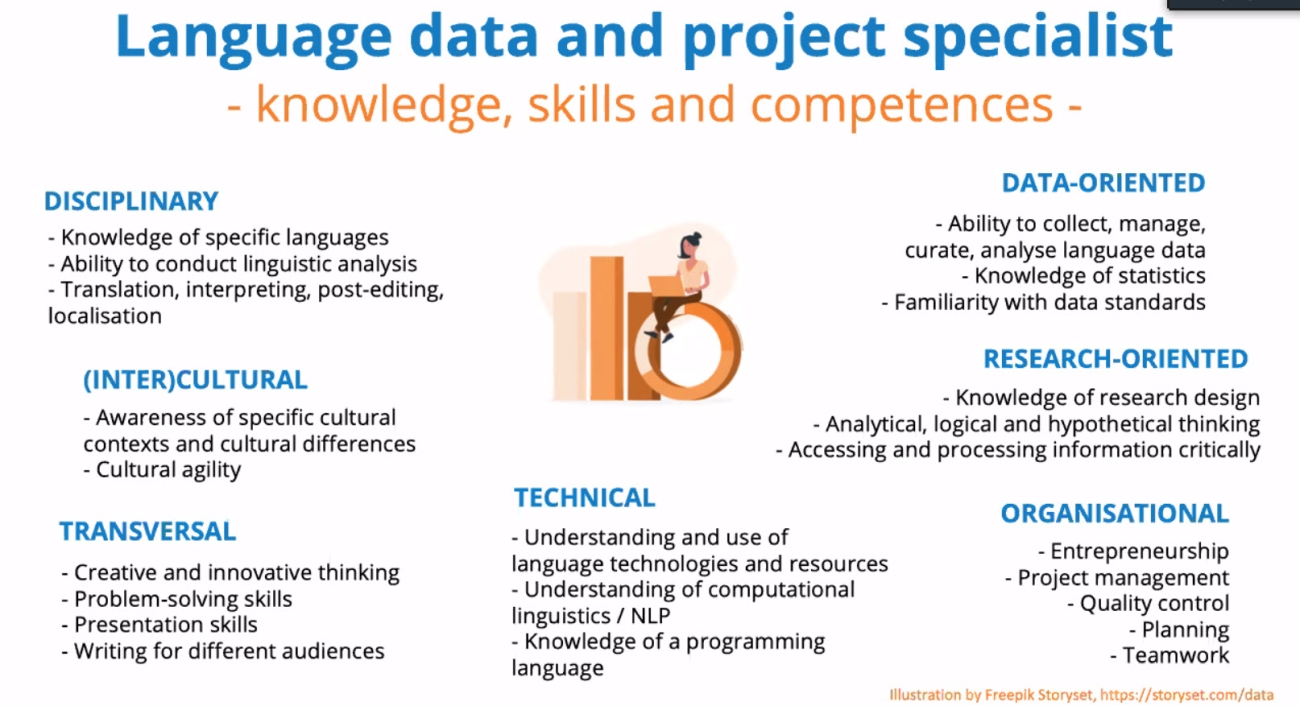After a brief introduction to CLARIN by Francesca Frontini, Stavros Assimakopoulos, the project manager of UPSKILLS, gave an overview of the Erasmus+ strategic partnership project and its eight consortium partners (including CLARIN ). The project aims to address skills gaps and mismatches in students of language-related disciplines to increase their employability. After a thorough needs analysis, guidelines for integrating research-based teaching and learning content for the following topics will be developed:
|
|
Darja Fišer, Associate Professor at the Faculty of Arts, University of Ljubljana, highlighted the role of CLARIN in UPSKILLS: to support the training of future language data professionals through the creation of best-practice guidelines for integrating research infrastructures into teaching, as well as the development of the modules on speech processing (Radboud University) and data standards and repositories (CLARIN ERIC). Both the guidelines and the learning content will be developed in the course of 2021.
Maja Miličević Petrović, Associate Professor at the University of Bologna, presented the knowledge, skills and competences of the new UPSKILLS profile for the ‘language data and project specialist’.

- Language data analyst (collects, annotates and analyses language data)
- Language data scientist (researches language data and processes)
- Language data manager (cleans, curates and manages language data)
- Language project manager (coordinates the language projects and workflows).
One of the main outcomes of breakout discussions was that the best-practice guidelines for integrating CLARIN into teaching will be useful not only for universities but also for research libraries that guide students and researchers on research data management. Here is an overview of the topics that will be included in the guidelines, as well as the feedback collected from the cafè participants.
CLARIN data-oriented competences
The participants suggested that at BA level, the focus should be on creating and using language resources for teaching purposes, while at the MA and PhD level, the focus should be on the publication of research results, legal issues related to data acquisition, reuse and copyright, and other advanced topics, such as the FAIR principles, Open Science and Research Data Management (RDM). However, these views seem to contradict the FAIRsFAIR recommendations for Higher Education Institutions, which suggest that students at BA level should be able to define the FAIR, OPEN and RDM concepts, describe their relevance and benefits and recognise the relationship between them.
CLARIN Reusable Learning Objects
The idea of using Reusable Learning Objects (RLOs) as a blended learning tool in teaching core CLARIN services in Higher Education Institutions was born during the CLARIN in the Classroom session at the CLARIN 2020 Annual Conference. The breakout discussion revealed that RLOs are in general more useful than a complete course because they are small, flexible, easy to adapt and integrate into lessons, courses or assignments. It is important that the metadata of the RLOs fits the metadata of the teachers' courses.
Further, the teachers prefer to have both text instructions and short videos in the RLOs explaining how to access and use specific CLARIN services. Piloting the RLOs with students from different countries would also be useful. Last but not least, the participants expressed their wish of creating a pool of volunteer teachers to network, share their experience and teaching materials, and contribute to the design of new learning materials.
Tracking the students’ research projects and experiments
The UPSKILLS consortium partners from the University of Zurich will contribute to the guidelines with a lab notebook template that teachers can use to track the students’ research projects and experiments. The work on this task will start in the first half of 2022.
Making teaching materials FAIR
During several events and interactions with the teachers in the CLARIN network, it has been suggested that they would benefit from a library of teaching materials published in open access that they could reuse and adapt. For this purpose, CLARIN has launched the Teaching with CLARIN Call to collect existing teaching materials on topics related to research methods, data acquisition and management.
An analysis of the first round of submitted materials has revealed that teachers would benefit from more guidance on how to create and share their materials in the context of open science. Consequently, the CLARIN guidelines will include a set of discipline-specific recommendations on how to make teaching and training materials FAIR. The recommendations will be based on Ten simple rules for making training materials FAIR (plos.org) and insights from the Community of Practice for Training Coordinators (CoP) task force on the subject.
The guidelines and the learning content developed in the context of the UPSKILLS project will be finalised and published by October 2022 in open access and free to pilot and use by the teachers and trainers worldwide.
If you like to keep up to date with CLARIN’s initiatives on training and education, please subscribe to our dedicated mailing list for teachers and trainers.
For more information on the UPSKILLS project and the first project deliverables, please visit the project website and subscribe to the newsletter.